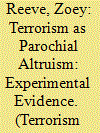| Srl | Item |
| 1 |
ID:
126352


|
|
|
|
|
| Publication |
2013.
|
| Summary/Abstract |
Because political science draws heavily from other disciplines-psychology and economics-in its use of experimental methods, we often fail to note how each experimental tradition developed in ways, while serving those field's primary goals, that often present contradictory imperatives that may not serve political science equally well. I provide a brief history of experimental traditions in psychology and economics, and then suggest, in all humility, an integrated set of best practices for the use of experiments in political science.
|
|
|
|
|
|
|
|
|
|
|
|
|
|
|
|
| 2 |
ID:
183028


|
|
|
|
|
| Summary/Abstract |
Drawing on the evolutionary approach, this paper proposes that certain universal cognitive mechanisms (parochial altruism) underlie engagement and involvement in terrorism. Parochial altruism is the tendency to perceive and behave in ways that favour ingroups and disfavour outgroups in light of particular intergroup cues, whilst incurring some kind of personal cost in order to effect that bias. New data is generated by implementing an experiment and using a student sample to investigate certain features of parochial altruism. Findings indicate that sensitivity to parochial altruism varies across individuals, according to sex, group size, and feelings of vulnerability. Some individuals are more sensitive to perceiving and responding to threatening outgroups, which is relevant to the radicalisation process. It is proposed that in certain conditions, such as the presence of radicalisation risk factors, those most sensitive to parochial altruism may be more open to perceptions of threat to the ingroup, extremist ideology, and more likely to engage in violent actions than others.
|
|
|
|
|
|
|
|
|
|
|
|
|
|
|
|